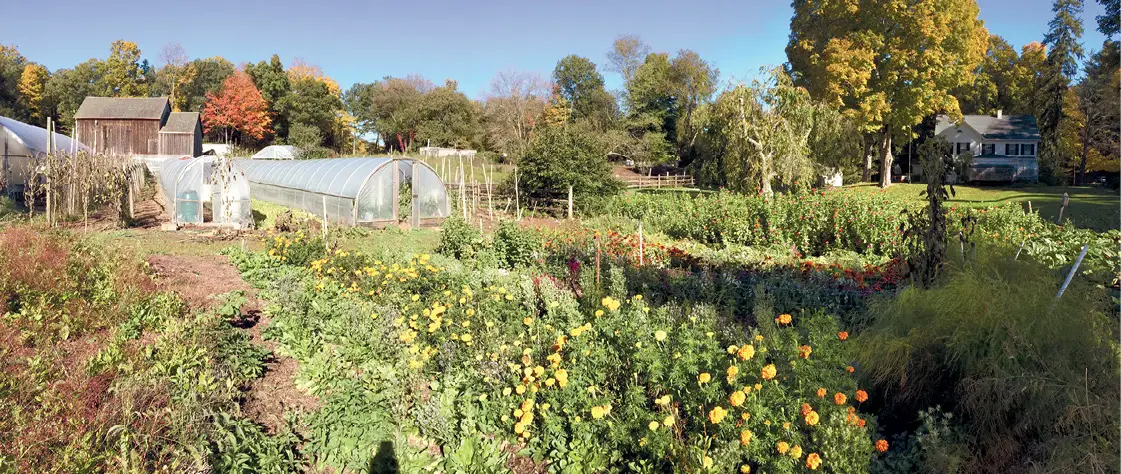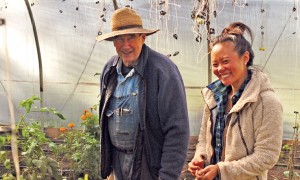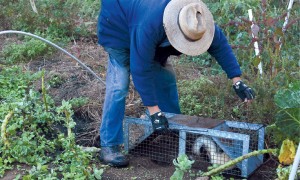John and Lynn Holbrook have been farming their property along Route 53 in Bethel for more than 40 years, but only in the last decade have they joined the rising tide of Fairfield County”™s clean food movement. They are now an example of how agricultural entrepreneurs have capitalized on the relatively new niche market, turning hobbies into careers.
“Just keeping up with the demand, that”™s been a little difficult,” John Holbrook said.
He said business has been good this year, adding new customers and restaurants to his base of 800 regular visitors ”” perhaps the most significant sign of the increasingly popular locally sourced food movement.
“There is an amazing number of chefs who are now moving toward sustainable menus,” he said.

- Part of Holbrook Farm in Bethel including the Holbrook”™s home to the far right. Photo by Reece Alvarez
In Holbrook”™s first commercial year, the farm turned a profit of $15,000. Now the farm makes $300,000 to $400,000 a year.
Driven by growth, the farm is expanding, particularly due to a dozen consistent restaurant customers who have come to partner with the farm thanks to the efforts of farm manager Jessica Wong.
Restaurant partners include chef Bill Taibe”™s trio of sustainability-focused restaurants, The Whelk in Saugatuck and le Farm and Kawa Ni in Westport as well as Elm in New Canaan and The Schoolhouse at Cannondale in Wilton.
According to the Fairfield County Farm Bureau, the agritourism industry in the county is growing with more than 310 farms currently operating.
As a measure of its growth, Holbrook Farm is at a point of transition as Wong, who started as an inexperienced volunteer and worked her way into the position of farm manager, has been tapped by Holbrook to operate the farm under a lease agreement as he and his wife phase themselves out of the day-to-day operations.
Wong represents a new wave of young professionals leaving the corporate ranks for the fields. A graduate of Skidmore College with degrees in Asian studies and anthropology, she took a brief stab at marketing before realizing her calling.
“It really only took a year in an office to realize I didn”™t want to be in an office,” she said.
While bringing in restaurants as consistent customers has been a new development for the small four-acre farm, its core business comes from its loyal customer base, Wong said.
It is not only the loyalty of customers that has sustained the farm, but also the relationships fostered through the personal touch a small farm, particularly when competing in the increasingly popular organic produce markets.
“I have been growing all my life naturally, since I was a small guy,” Holbrook said. “They called it organic back then but we”™re not certified so I can”™t put a sign out that says I”™m organic, but anybody that comes in here knows I”™m organic because they look at my leaves and know the bugs are doing a good job.”
Operating year-round the farm produces an array of traditional products like kale, carrots and tomatoes as well as fresh eggs, honey and baked goods, some of which are sold or grown on-site by partner farmers. He has also adapted to the county”™s changing demographics and growing demand for specialty produce like okra, jilo and maxixe.
Holbrook”™s “go with the flow” philosophy permeates the farm, which is dotted with a spectrum of flowers not only to be sold in his market, but also as essential sources of food for the pollinators who sustain his crops.
“Holbrook Farm has been clean of pesticides and herbicides for at least the last 30 years that we have owned the land. We don”™t spray with pesticides, we try to use beneficial insects and companion plants,” according to the farm website. “And we don”™t use herbicides. Weeds have a place in the ecological mix as long as they are controlled.”
Access to land remains a challenge.
“We are trying to get younger, small farmers to find the land and start farming,” he said. “Your issue is how much does your land cost.”
The growth of the industry has come with casualties, Holbrook and Wong said.
“I think a lot of young people are getting into the farming thing, it has almost become a little trendy, but I find they don”™t have the stamina,” Wong said. “I am hearing a lot of stories now of people closing down their farms after maybe a few years. It is hard; farming is really expensive and if you talk to any of the seasoned farmers, the only way to make money is if you have money.”
For Wong the challenge of a modern agriculture life is an all or nothing venture.
“This is my bread and butter,” she said. “I don”™t have any other means of income coming in.”





















